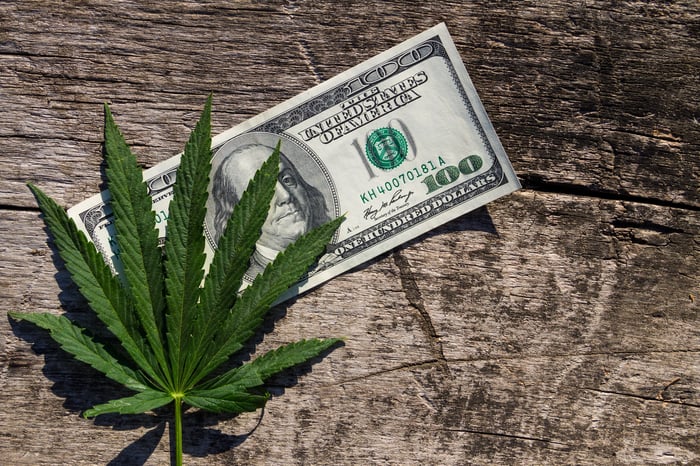Weed. Pot. Ganja. Reefer. Whatever you call it, you can buy marijuana legally in Canada for recreational use beginning today. The opening of Canada's recreational market is a significant win for pro-pot activists and it opens the door to billions of dollars per year in new revenue for Canada's top marijuana companies. Read on to find out how big Canada's marijuana market could be and if you should invest in marijuana stocks on this news.
First, what's going on
Canada first legalized medical marijuana back in 2001, but it wasn't until 2014 that sales began to take off following changes to regulations that created a path to licensing growers and retailers. Since then, Canada's medical marijuana market sales have skyrocketed to an estimated 600 million Canadian dollars annually from about CA$100 million, according to data compiled by Statista.

IMAGE SOURCE: GETTY IMAGES.
The surge in Canada's medical marijuana sales has been driven by growing acceptance by physicians and awareness of cannabis benefits by consumers. According to Health Canada, the number of physicians who've written marijuana prescriptions in Canada now eclipses 16,000 and the number of patients registered with licensed medical marijuana providers total over 330,000. Roughly a year ago, those numbers were below 10,000 and only slightly above 200,000, respectively.
The push for access to marijuana hasn't been limited to medicinal use, either. Canada's Prime Minister Justin Trudeau won his election in 2015 on a platform that included legalizing recreational marijuana and waning influence of Canada's conservative party resulted in Trudeau's Liberal Party filing a legalization bill, C-45, in 2017. After much debate -- and 40 amendments -- the senate voted in favor of C-45 in June, prompting Trudeau to announce recreational sales would commence on Oct. 17.
The passage of the Cannabis Act ends 95 years of marijuana prohibition in Canada, and while each Canadian province can implement the law differently, the Cannabis Act generally allows adults to purchase and possess up to 30 grams of dried cannabis for personal use, with each gram of dried cannabis equaling:
- 5 grams of fresh cannabis
- 15 grams of edible product
- 70 grams of liquid product
- 0.25 grams of concentrates (solid or liquid)
- 1 cannabis plant seed
How big could Canada's marijuana market be?
It's hard to know the exact size of Canada's marijuana market because most sales occur on the black market. Nevertheless, total marijuana sales in Canada, including medical and illicit sales, are estimated at about CA$6 billion annually.
Medical marijuana should still account for hundreds of millions of dollars in sales next year and some consumers will continue to buy marijuana on the black market, but number crunchers at the research firm Deloitte think total marijuana sales could increase to $7.1 billion in 2019, with up to $4.3 billion of that figure coming from the legal, recreational market.
If that estimate is anywhere near correct, it would represent a boon to Canada's top marijuana companies, including Aurora Cannabis, Canopy Growth, Aphria Inc., and Tilray Inc. As of their most recently reported fiscal quarters, they had combined revenue of less than CA$85 million.
| Company | Quarterly Revenue |
|---|---|
| Aurora Cannabis (ACB -1.86%) | $33.0 million |
| Canopy Growth (CGC -3.13%) | $25.9 million |
| Aphria Inc. (NASDAQOTH: APHQF) | $13.3 million |
| Tilray Inc. (TLRY) | $12.7 million |
| Total | $84.9 million |
Data source: Quarterly filings. All $Canadian.
Are these marijuana stocks worth buying?
It's no secret that Canada's grand opening of its recreational marijuana was today. Investors have already flocked to these stocks, and as a result, these companies are trading at eye-popping valuations relative to their sales.
Aurora Cannabis is on track to have 570,000 kilograms of funded marijuana production capacity next year and that could make it Canada's top-selling producer, but its $10.5 billion market cap already values it at 253 times its sales over the past 12 months. Similarly, Canopy Growth is on track for over 500,000 kilograms of capacity next year and its $12.4 billion market cap values it at 185 times trailing sales. With a $14.5 billion market cap and 522 times price-to-sales ratio, Tilray's even more expensive. By comparison, Aphria's $3.6 billion market cap and price-to-sales ratio of 129 looks cheap -- that is, until you remember the average price-to-sales ratio for technology stocks, which are arguably the most expensive stocks on this measure, is below five.
It's little wonder then why anyone with a penchant for value investing is steering clear of this industry, but an argument can be made that growth investors ought to buy marijuana stocks, particularly in long-term portfolios.
Canada's marijuana market is worth billions of dollars per year, but it represents only a tiny proportion of the $150 billion global market.
If Canada's recreational market is a success, it could convince other countries to follow suit, including the United States, and if that were to happen, then the legal marijuana market these companies could target would be much, much bigger. How big is anyone's guess, but wine, beer, and spirits company Constellation Brands (STZ -0.18%), which owns 38% of Canopy Growth, thinks global retail marijuana sales could exceed $200 billion in 15 years. If they're on target, then today's sky-high valuations won't matter.





